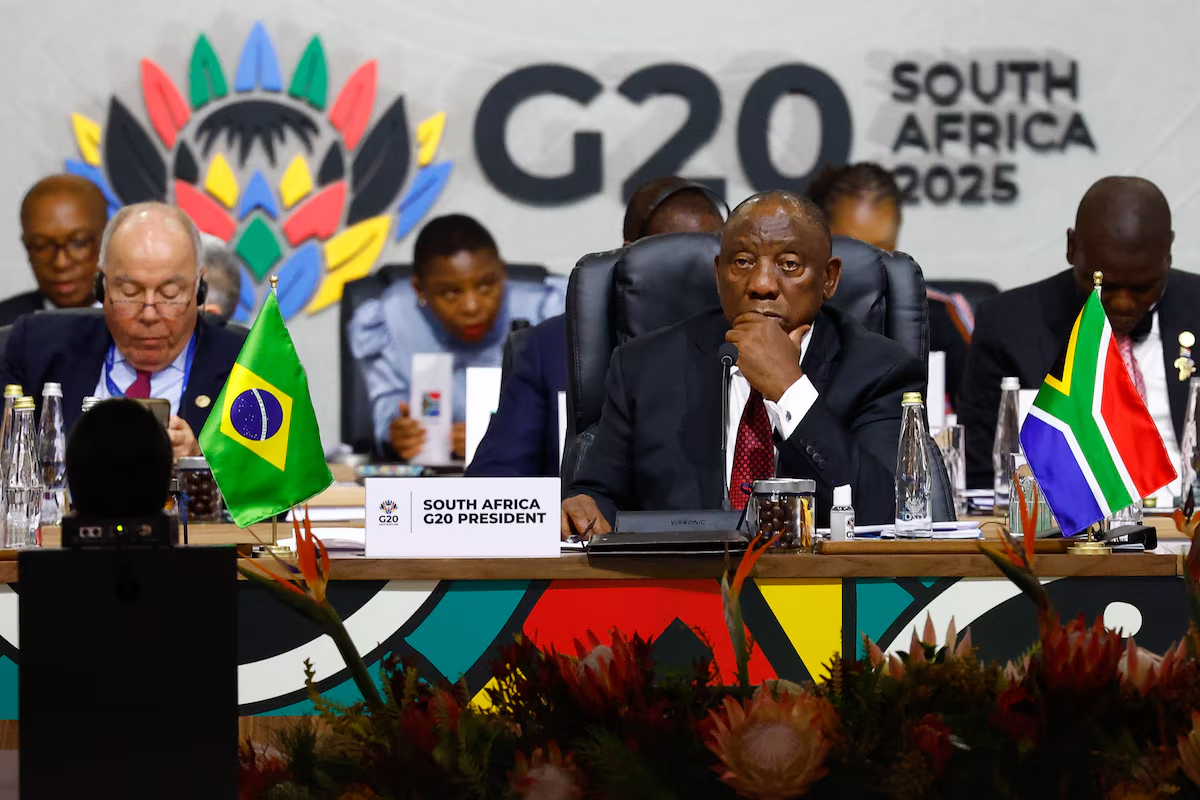G20 leaders release declaration on climate change and debt, defying U.S. pressure

Open this photo in gallery:
South African President Cyril Ramaphosa during a plenary session of the G20 leaders’ summit in Johannesburg on Saturday. The U.S. was the only country that refused to attend the G20 meet, the first summit to be held on African soil.Thomas Mukoya/The Associated Press
Refusing to bow to pressure from the Trump administration, G20 leaders have approved a declaration on climate change, debt relief and other priorities that the United States has rejected.
The agreement was announced in the opening minutes of the summit of Group of 20 leaders on Saturday morning in Johannesburg, despite strong objections from U.S. President Donald Trump’s administration, which is boycotting the summit.
South African officials on Saturday shared a video showing dozens of negotiators applauding loudly and cheering in celebration after they reached the agreement in closed-door talks a day earlier. The deal was then announced by the host leader, South African President Cyril Ramaphosa, at the start of the opening session.
“There has been overwhelming consensus and agreement that one of the tasks we should undertake, right at the beginning, is to execute the task we have come here for principally — which is, by overwhelming consensus, to adopt our declaration,” Mr. Ramaphosa told the G20 leaders.
The reaction from the summit leaders was not included in official broadcasts, but South African foreign ministry spokesperson Clayson Monyela said in a social media post: “The plenary room just erupted with applause.”
G20 summit in South Africa overshadowed by eleventh-hour dispute over U.S. participation
Argentina, a strong ally of Mr. Trump, was the only country at the summit to question the announcement. Argentinian Foreign Minister Pablo Quirino, speaking at the opening session, said there was no consensus on some points of the declaration, including the wording of a sentence on seeking peace in Palestinian territories. The declaration lists “the Occupied Palestinian Territory” as one of several conflicts where the G20 leaders are seeking a just and lasting peace.
Mr. Ramaphosa, however, said Argentina was given a chance to voice its misgivings and had still agreed to adopt the declaration.
Argentina’s foreign ministry later issued a statement saying that it did not endorse the declaration. “Our country regrets that a declaration was deemed adopted without the consensus of all members of the forum, including Argentina, among others,” it said.
Declaration includes issues rejected by Trump administration
The final declaration, released to journalists on Saturday, does not describe its text as a formal G20 commitment. Instead, it says the declaration was an agreement among “leaders of the G20, who gathered in Johannesburg.”
The declaration includes several paragraphs on fighting climate change, promoting a transition to renewable energy and providing debt relief to low-income countries – issues that the Trump administration has largely rejected.
The United States was the only G20 country that refused to attend the summit, the first G20 summit to be held on African soil. Eighteen of the G20 countries, along with the European Union and the African Union, both of which are official members of the group, were represented at the summit by their top leaders or senior officials.
When it became clear that the G20 negotiators were still working on a final declaration despite the U.S. boycott, the White House issued its objections and said it was “shameful” to announce a declaration without U.S. agreement. It said the G20 should merely issue a closing statement by its host country, which would carry no official weight. But South Africa rejected those demands.
G20 envoys agree on draft leaders’ declaration despite U.S. boycott, sources say
“There is overwhelming support for every paragraph in the final declaration, which was reached by consensus,” said Zane Dangor, director-general of South Africa’s foreign ministry and one of the negotiators who struck the deal.
John Kirton, director of the G20 Research Group, a global network of researchers with its headquarters at the University of Toronto, said the decision to defy the U.S. pressure and issue a joint declaration was “a big win” for South Africa and the world.
“It was a magnificent moment and one of the memorable in the history of G20 summits,” Mr. Kirton said.
“It was a declaration of about 11,000 words with about 160 commitments, with much attention to climate change, gender equality and racial equality, and many other things that Trump disliked.”
Mr. Trump announced the U.S. boycott earlier this month after falsely accusing South Africa of “slaughtering” its white minority and illegally seizing the farmland of white farmers. No other country boycotted the summit, although several, including Argentina, sent only a foreign minister or other senior official.
Less than two days before the summit began, the United States requested permission to send a delegation of eight diplomats to attend the G20’s closing session to receive a formal handover from South Africa, since the group’s next summit will be held in Miami next year. South Africa rejected the proposal. By Saturday, there was still no agreement on U.S. participation.
Open this photo in gallery:
Mr. Ramaphosa speaks with Prime Minister Mark Carney at the G20 leaders’ summit.Misper Apawu/Reuters
Prime Minister Mark Carney and Foreign Affairs Minister Anita Anand, who attended the summit, did not comment publicly on the G20 declaration on Saturday, but Ms. Anand said the federal government agreed with South Africa’s official summit themes of solidarity, equality and sustainability.
“The bottom line is, yes, it’s a great day for multilateralism,” Ms. Anand told journalists on Saturday afternoon after the G20’s opening session.
“Canada looks forward to ensuring that we are fulfilling the work that this G20 multilateral conference aims to achieve.”
A federal official later told The Globe and Mail that Canada agrees with the final declaration. The Globe is not identifying the official because they are not authorized to speak publicly.





